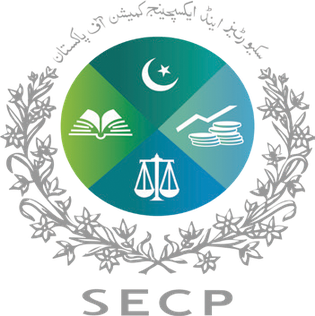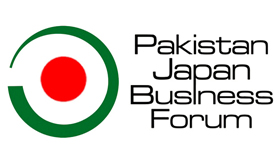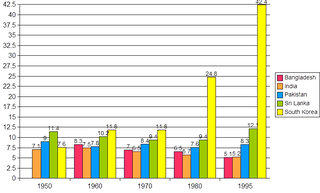Related Research Articles

Mian Muhammad Nawaz Sharif is a Pakistani businessman and politician who has served as the Prime Minister of Pakistan for three non-consecutive terms. He is the longest-serving prime minister of Pakistan, having served a total of more than 9 years across three tenures. Each term has ended in his ousting.

Zulfikar Ali Bhutto was a Pakistani barrister, politician and statesman who served as the fourth president of Pakistan from 1971 to 1973, and later as the ninth prime minister of Pakistan from 1973 to 1977. He was the founder of the Pakistan People's Party (PPP) and served as its chairman until his execution.
Ghulam Ishaq Khan,, commonly known by his initials GIK, was a Pakistani bureaucrat, politician and statesman who served as the seventh president of Pakistan from 1988 to 1993. He previously served as Chairman of the Senate from 1985 to 1988 under president Muhammad Zia-ul-Haq, and was sworn in shortly after Zia's death.

Shaukat Aziz is a Pakistani former banker and financier who served as 17th prime minister of Pakistan from 28 August 2004 to 15 November 2007, as well as the finance minister of Pakistan from 6 November 1999 to 15 November 2007. During his childhood he studied at St Patrick's High School, Karachi. Aziz graduated from the Institute of Business Administration in Karachi, and joined the corporate staff of the CitiBank Pakistan in 1969. He served in various countries' governments as CitiBank financier, and became executive vice-president of Citibank in 1999. After accepting a personal request by General Pervez Musharraf, Aziz returned to Pakistan from the United States to assume charge of the Finance Ministry as its finance minister while taking control of the country's economy. In 2004, Aziz was nominated by the Musharraf loyalist government led by Pakistan Muslim League (Q), to the position of prime minister after the resignation of Zafarullah Khan Jamali on 6 June 2004.

The Ministry of Finance and Revenue or Ministry of Finance is a ministry of the Government of Pakistan tasked to ensure a strong Pakistani economy by developing policies of sound economic management and providing expert advice to the government.

The Securities and Exchange Commission of Pakistan (SECP) is the financial regulatory agency in Pakistan whose objective is to develop a modern and efficient corporate sector and a capital market based on sound authority principles, in order to encourage investment and foster economic growth and prosperity in Pakistan.

The Pakistan Steel Mills Corporation, colloquially referred to as Pak Steels, is a Pakistan State-owned company that produced long-rolled steel and heavy metal products in the country.
Events from the year 2007 in Pakistan.

The Five-Year Plans for the National Economy of Pakistan, were the series of nationwide centralised economic plans and targets as part of the economic development initiatives, in the Pakistan. The plan was conceived by the Ministry of Finance (MoF), and were studied and developed by the Economic Coordination Committee (ECC) based on the theory of Cost-of-production value, and also covered the areas of Trickle-down system. Supervision and fulfillment of this programme became the watchword of Pakistan's civil bureaucracy since early 1950s.

PJBF is a registered body U/S 32 of the Companies Ordinance 1984 of Pakistan. The Forum has been granted a license from Securities and Exchange Commission of Pakistan, Company Registration Office, Karachi.
The Pakistan-Japan Business Forum was established on February 06, 2001 in the presence of dignitaries from Pakistan and Japan for the promotion of business between the two countries. It has currently 135 member companies.

The energy policy of Pakistan is formulated and determined by the federal, provincial, and local institutional entities in Pakistan, which address the issues of energy production, distribution, and consumption of energy, such as gas mileage and petroleum standards. Energy policy requires the proper legislation, international treaties, subsidies and incentives to investment, guidelines for energy conservation, taxation and other public policy techniques.

Sartaj Aziz is a Pakistani economist and a strategist, having previously served as the deputy chairman of the Planning Commission of Pakistan, member of the federal cabinet as the de facto Minister for Foreign Affairs, a Federal Senator as well as the National Security Advisor.

Corruption in Pakistan is widespread, and extends to every sector from government to judiciary, police, health services, education, and military.

The Nationalisation process in Pakistan was a policy measure programme in the economic history of Pakistan, made Pakistan's industrialization worst and lifted the trust of businessmen and investors. It first introduced, promulgated and implemented by Zulfikar Ali Bhutto and Pakistan Peoples Party to lay the foundation of socialist economics reforms to improve the growth of national economy of Pakistan. Since the 1950s, the country had undergone a speedy industrialisation and became an industrial paradise in Asia. But, as time progressed, the labour trade unions and labour-working class had increasingly strained relations with the industrial business oligarch class, having neglected to improve working conditions and failing to provide a healthy and safe environment for the workers in these industrial industries.

The Privatisation process in Pakistan is a continuous policy measure program in the economic period of Pakistan. It was first conceived and implemented by the then-people-elected Prime Minister Nawaz Sharif and the Pakistan Muslim League, in an attempt to enable the nationalised industries towards market economy, immediately after the economic collapse of the Soviet Union in 1989–90. The programme was envisaged and visioned to improve the GDP growth of the national economy of Pakistan, and reversal of the nationalisation programme in 1970s— an inverse of the privatisation programme.
The Seventh Five-Year Plans for National Economy of Pakistan, otherwise known as Seventh Plan, were a set of a highly centralized and planned economic development targets designed for the improvement of the standard of living, and overall strengthening of gross domestic product (GDP) growth in Pakistan, between the period of 1988 until its termination in 1993.

Pakistan began a period of economic liberalisation in the 1990s to promote and accelerate economic independence, development, and GDP growth.
The Periods of Stagflation, also known as Stagflation in Pakistan or inflation and unemployment in Pakistan, are periods of economic stagflation in Pakistan's economic history, which has affected Pakistan's economic trajectory since its inception.

The Pakistan National Shipping Corporation (PNSC) is a Pakistani national flag carrier and is one of Government of Pakistan's most profitable state-owned entities, most recently having recorded its highest ever profit of PKR 5.6 billion under the chairmanship of Rizwan Ahmed. The corporation is principally engaged in the business of shipping, including charter of vessels, transportation of cargo and providing commercial, technical, administrative, financial and other services to its subsidiaries and third parties.

Nishat Group is a Pakistani multinational conglomerate company which is based in Lahore, Pakistan. The company was founded by Pakistani business magnate Mian Muhammad Yahya in 1951. Mian Muhammad Mansha is the current chairman of the group.
References
- ↑ PAKISTAN Inc
- ↑ Pakistan Inc wants to dance with India Inc. Will the Indians oblige?, The Economic Times
- ↑ Pakistan, Inc.: Indians not allowed, The Economic Times
- ↑ Pakistan Inc, Pakistan Today
- ↑ E-Govt., Electronic Government. "The Companies Ordnance Act, 1984" (PDF). Security and Exchange Commission. Government of Pakistan. Archived from the original (PDF) on 10 May 2012. Retrieved 12 June 2012.